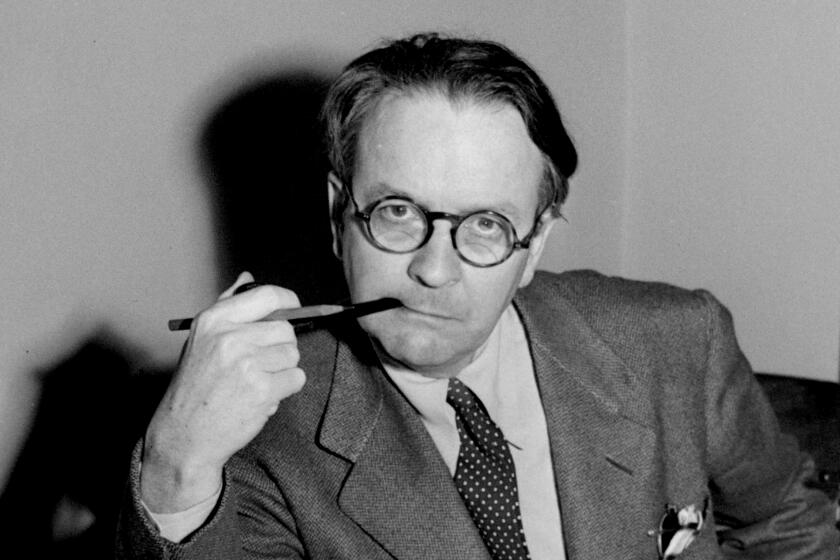‘Salvation’ Reveals Depth of Black Despair
- Share via
A seeker of love: That’s one way to describe bell hooks. Throughout a 20-year career as a feminist, cultural critic and intellectual, she has written numerous essays on love or, more accurately, what the lack of love does to the individual and society. Last year, drawing upon painful examples from her own life experiences as well as from her extensive reading of psychology, spiritual and self-esteem texts, hooks published “All About Love: New Visions,” her most thorough and accessible treatment of love to date.
But more central than her quest to understand love is hooks’ primary concern, black culture. In her latest book, “Salvation: Black People and Love,” hooks blends the two interests by focusing on African Americans and the forces that have moved black people from segregated, yet generally loving, communities in the 1950s and ‘60s into the current maelstrom of what she characterizes as a patriarchal, violent America. Yet, in many ways, “Salvation” is even more important precisely because it risks so much in revealing the depth of black despair of which no American should be proud.
Much of what hooks writes about in “Salvation” has been covered in limited fashion in her other writings, which will be familiar territory to some readers and new ground for others. Using as her basic premise the often-cited theory that the root cause of black “lovelessness” today is dehumanization dating to the beginnings of slavery, the author traces the debate from the works of 20th century black writers through the self-hating lyrics of black rappers and the underlying reasons for a lack of “believability” in images of loving black families as portrayed in “The Cosby Show.”
And if that doesn’t stir enough controversy, hooks goes on to argue that the civil rights movement’s focus on social justice and equal access came at the expense of providing black people with a method to sustain loving relationships in a consumption-driven, post-segregation era. Coupled with what she considers the anti-female, anti-homosexual rhetoric of the black power movement of the late ‘60s and early ‘70s as well as the modern Nation of Islam, hooks contends, “the abandonment of a discourse on love, of strategies to create a foundation of self-esteem and self-worth that would undergird the struggles for self-determination, laid the groundwork for the undermining of all our efforts to create a society where blackness could be loved, by black folks, by everyone.”
Malcolm X and the Rev. Martin Luther King Jr., the film “As Good as It Gets” and the novels of Terry McMillan and Omar Tyree--no one is spared hooks’ insightful critique. Initial chapters examine the “soul murder” black children endured at the hands of post-slavery parents who wanted to ensure their children survived racial apartheid, which caused later generations to adopt a mask of indifference, a “false self--to make it in the public, white dominated world.” Self-love is treated in another chapter, with hooks pointing out that self-affirmation becomes impossible in a patriarchal society. hooks also examines images and issues particular to black women and men--the traps of an idealized mother love that “actually hindered the self-development of their children by not teaching them to be responsible for their lives”; the unjustified put-down of single mothers; and the dangers of young black men who adopted, during the black power movement, the patriarchal attitudes of whites and whose “newly found manhood could only be affirmed when they could subordinate women.” Black men and women in relationships are analyzed in later chapters that deconstruct various forms of romantic attachment, both heterosexual and homosexual, and the wedge that patriarchal white supremacist (hooks’ term for what most call racism) thinking can cause between couples.
Some of the points made in “Salvation” are revelatory, such as bells’ analysis of single black mothers’ relationships with their sons, but others, like hooks’ critique of civil rights leaders, seem at first to judge their actions against future consequences that they did not live to address. And, at times, hooks’ intent to delineate features of King’s “beloved community” gets lost in the intricacy of her theorizing. Yet, by the time the reader arrives at “Loving Justice,” the book’s final chapter, one cannot disagree that the seeds of hopelessness and lovelessness in black communities have been sown by myriad actions, conscious and unconscious, of whites and blacks.
“Salvation” will find its most vocal support among progressive blacks and their allies committed to creating more loving communities. One hopes that it stimulates not only conversation but also practical solutions to a despair that may have its origins in poor black communities, but eventually affects us all.
More to Read
Sign up for our Book Club newsletter
Get the latest news, events and more from the Los Angeles Times Book Club, and help us get L.A. reading and talking.
You may occasionally receive promotional content from the Los Angeles Times.








